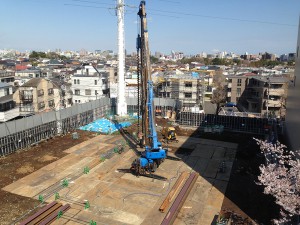ELSI Blog
49 Growing ELSI

In this photo, the first I-beam column is being installed at the new ELSI building construction site. Sakura (cherry blossoms) are visible from the trees in front of the Earth and Planetary Science Department at Tokyo Institute of Technology.
On 1 April 2014, as the sakura (cherry blossoms) were in full bloom around the campus to herald the onset of spring, construction began in earnest on our new ELSI building. The ELSI building will fill the last available space at the north end of the Ishikawadai Area of the Ookayama Campus of the Tokyo Institute of Technology, and its construction is the most visible expression of ELSI's growth. We are also experiencing a large influx of staff and research scientists in 2014, including many foreigners, who will venture into the shops, restaurants, and apartments in the local area, and whose work activities will breathe life into our new headquarters when it is ready. Additionally, dozens of visitors continue to come and go, hailing from academic institutions around the entire world. Surely, the neighborhood knows that something big is going on; we hope they can forgive the inconveniences that it may cause from time to time, and we appreciate their kindness and hospitality that makes a big difference in the quality of life for foreigners working at ELSI.
When the ground was finally broken on 1 April, the digging crew struck a critical electricity link to the Ishikawadai Area, and the lights went out for the entire day, causing serious difficulties for laboratory experiments that require precise temperature control. The influx of new staff and visitors has now filled every desk in our present building, many visitors are camping out in the 1st floor communications area, and the administrative office had to be moved into our 1st floor seminar room to make space for a new chemistry lab on the 4th floor. We also received unexpected news from the government that our planned funding for the new fiscal year (beginning on 1 April) would not be increased as much as we previously thought, throwing our plans into a serious tailspin and forcing us to make difficult sacrifices in order to salvage our mission. And an internal task force is working feverishly to improve the communications and management structure, which has not kept pace with the growth of ELSI.
The excitement of ELSI's growth, and the problems we encounter along the way, are simply a fact of life in this kind of endeavor. Establishing a new research institute that is dedicated to the most challenging scientific problems of all time- in addition to our radical charter from the government of Japan to internationalize and reform the research environment- is clearly not an easy task. Along the way we have encountered growing pains, some of which are inevitable, and some of which can only be attributed to our inexperience and steep ascent on the learning curve. We are academics, most of us from small departments at Tokyo Tech and elsewhere, and none of us have received anything like formal management or leadership training. It is analogous to a handful of pilots who only received flight training in a small Cessna aircraft being expected to jump into the cockpit of a 747 jet.
In the business world there is a very close analogy to our experience that is called a "start-up," at least in the USA. A start-up is simply a new company that has an idea for developing a product, a pot of money from investors, and an urgent timeline to develop into an enterprise capable of turning a profit. The situation is famous in the USA because of the many classic difficulties a start-up encounters in hiring the best people for the job, establishing a productive and rewarding work environment, and keeping the project on schedule. There will be difficult times in every start-up, the employees will sometimes feel like they don't have a clear direction from the leadership, the management will fall into traps of micro-managment and myopia, and will make big mistakes because they weren't ahead of the game as a consequence of constantly putting out fires.
Growing ELSI requires both empathy and patience. We need to understand the challenges that everyone at ELSI faces, and to support measures that can improve their situations and transform ELSI into a successful institute capable of addressing origin of Earth and Life in context. We need to admit when we cannot understand another person's situation, and consult directly with them to improve their work environment. And we need to unify and integrate ELSI, it is better if we are working together in the same context rather than struggling apart in parallel environments. We also need to be patient, the extremely ambitious goals of our institute will not happen overnight. The usual golden rule in the business world is that no start-up will turn a profit for at least 3 years from its inception. ELSI is only entering its 3rd fiscal year, and while our plan was to reach full strength and capacity by the end of this year, recent events make it clear that we must also be robust enough as an organization to deal with significant perturbations from the outside.
As a final note, I just want to express the fact that nobody at ELSI has given up on our mission, and we remain extremely grateful to Japan for making a large investment in this scientific enterprise. Even in the face of our growing pains, we are all focused and ambitious, and we want to reach for the highest possible goals of our science. We have an incredible administrative staff, an extremely talented research staff, a generous investment from the taxpayers of Japan, and a vision that compels us to be brave and tackle the most challenging scientific problems of all time. I wouldn't wish to be anywhere else than here, at ELSI.











